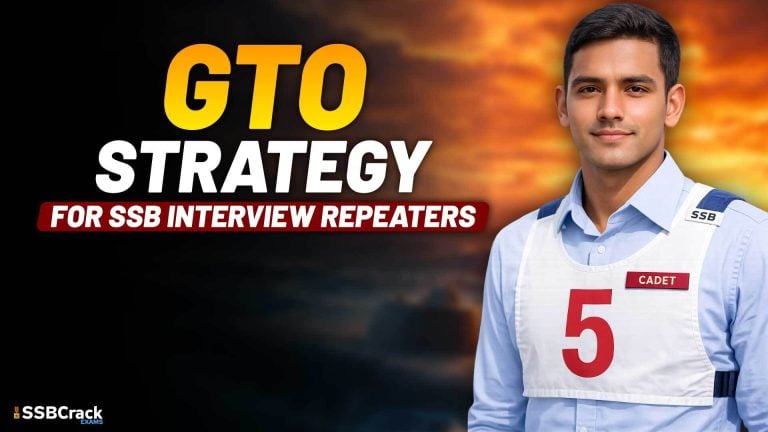Among the 15 Officer Like Qualities (OLQs) assessed in the SSB Interview, Stamina represents the physical and mental endurance necessary for an officer to perform consistently and effectively under stress. The Armed Forces demand long hours of work in challenging terrains, unpredictable environments, and adverse weather conditions. A future officer is expected to not only withstand physical strain but also maintain mental alertness and focus throughout.
Stamina at the SSB is not just about physical fitness — it is a reflection of how much sustained effort a candidate can put in without losing energy, interest, or efficiency.
What Is Stamina?
Stamina is the ability to sustain prolonged physical and mental effort without giving in to fatigue. It involves both:
- Physical stamina – endurance during tasks that require strength, speed, or continuous movement
- Mental stamina – the ability to remain focused, composed, and resilient over long durations
A candidate with high stamina:
- Performs all tasks with consistent energy
- Maintains enthusiasm from Day 1 to Day 5 of the SSB
- Doesn’t show signs of burnout or mental fatigue
- Stays mentally alert even during repetitive or physically demanding exercises
Where Is Stamina Evaluated in the SSB?
1. GTO Outdoor Tasks (Most prominent area)
🔹 Group Obstacle Race (Snake Race)
- Involves jumping, crawling, climbing, and running as a team
- Requires consistent physical output and team motivation
🔹 Progressive Group Task (PGT), Half Group Task (HGT), Final Group Task (FGT)
- Carrying structures, running back and forth with materials
- Requires a combination of physical effort and mental alertness
🔹 Individual Obstacles (IO)
- 10 physically demanding obstacles to be completed in 3 minutes
- Tests cardio fitness, agility, and muscular endurance
🔹 Command Task
- Involves lifting load, helping your subordinates, planning under stress
- Requires focused energy and composed breathing despite exertion
2. Interview & Psychology
🧠 Psychological Tests (especially SRT & TAT)
- Your character’s energy and focus level in problem-solving
- Are you taking sustained, realistic actions? Or giving up when tired?
🧾 Self-Description Test (SDT)
- Do others see you as an energetic person?
- Do you mention sustained efforts or the ability to push limits?
3. Day-Wise Assessment
- SSB is a 5-day process — each day is packed with long hours, limited rest, and intense tasks
- Assessors note whether you stay active, involved, and enthusiastic throughout, or start showing signs of exhaustion and disengagement
How Is Stamina Evaluated?
Assessors observe:
- Physical endurance: Can you complete tasks without excessive panting, sitting down, or giving up?
- Mental consistency: Do you perform equally well from Day 1 to Day 5?
- Enthusiasm and energy: Do you remain involved in all discussions and tasks?
- Recovery: How quickly do you bounce back after a physically tough activity?
It’s not about being a professional athlete — it’s about having the minimum required fitness and mental resilience to stay engaged, productive, and unshaken.
How Can Aspirants Showcase Stamina in SSB?
✔️ In GTO Tasks:
- Give full participation in all physical tasks
- Don’t hesitate or drop out mid-way in IO or Snake Race
- Avoid long resting gaps between tasks — maintain alertness
✔️ In GD, GPE:
- Stay equally energetic and attentive in later group tasks
- Don’t appear mentally tired or disinterested
✔️ In Interview:
- Narrate examples where you’ve shown consistency over time:
- Training regularly
- Studying for long hours with breaks
- Playing endurance-based sports
- Mention your fitness regime and how it helps you stay balanced
✔️ In Psychological Tests:
- TAT: Your hero should remain energetic and calm even after multiple failures
- SRT: You should respond with energy and problem-solving mindset, not avoidance
- SDT: Describe yourself as physically active and mentally balanced
How to Develop Stamina at Home, School, College, or Workplace
At Home:
- Follow a Morning Fitness Routine
- Jogging, stretching, or bodyweight training
- 🔹 Builds cardio and muscle endurance
- Practice Mindfulness or Deep Breathing
- Helps improve mental focus and reduces stress
- 🔹 Sharpens mental stamina
At School/College/University:
- Join Physical Activities or Sports
- Football, running, swimming, trekking, or basketball
- 🔹 Improves endurance and oxygen capacity
- Study for Long Periods With Structured Breaks
- Practice focused reading or problem-solving for 1-2 hours
- 🔹 Trains mind to focus for longer durations
- Lead Events That Involve Continuous Work
- Organize fests, hackathons, or campaigns
- 🔹 Tests your physical and mental stamina under pressure
At Workplace/Internship:
- Manage Long Projects Without Losing Momentum
- Maintain steady productivity over weeks
- 🔹 Reflects mental stamina and discipline
- Take Short Physical Breaks Instead of Mental Exhaustion
- Stretching, walking breaks help maintain alertness
- 🔹 Supports sustained work energy
- Participate in Office Sports/Fitness Initiatives
- Office marathons, fitness challenges
- 🔹 Promotes community-based stamina building
Final Thoughts
In the SSB Interview, Stamina is not just tested — it is constantly observed. From early mornings to late-night psychological tests, your ability to stay sharp, energetic, and motivated is under scrutiny. This trait proves you are ready to endure the physical and emotional pressures that come with life in uniform.
Remember, stamina is not built in a day — it’s trained, practiced, and earned over time. Every small choice to push harder, stay focused longer, and recover quicker adds up to the resilient stamina of an officer.







